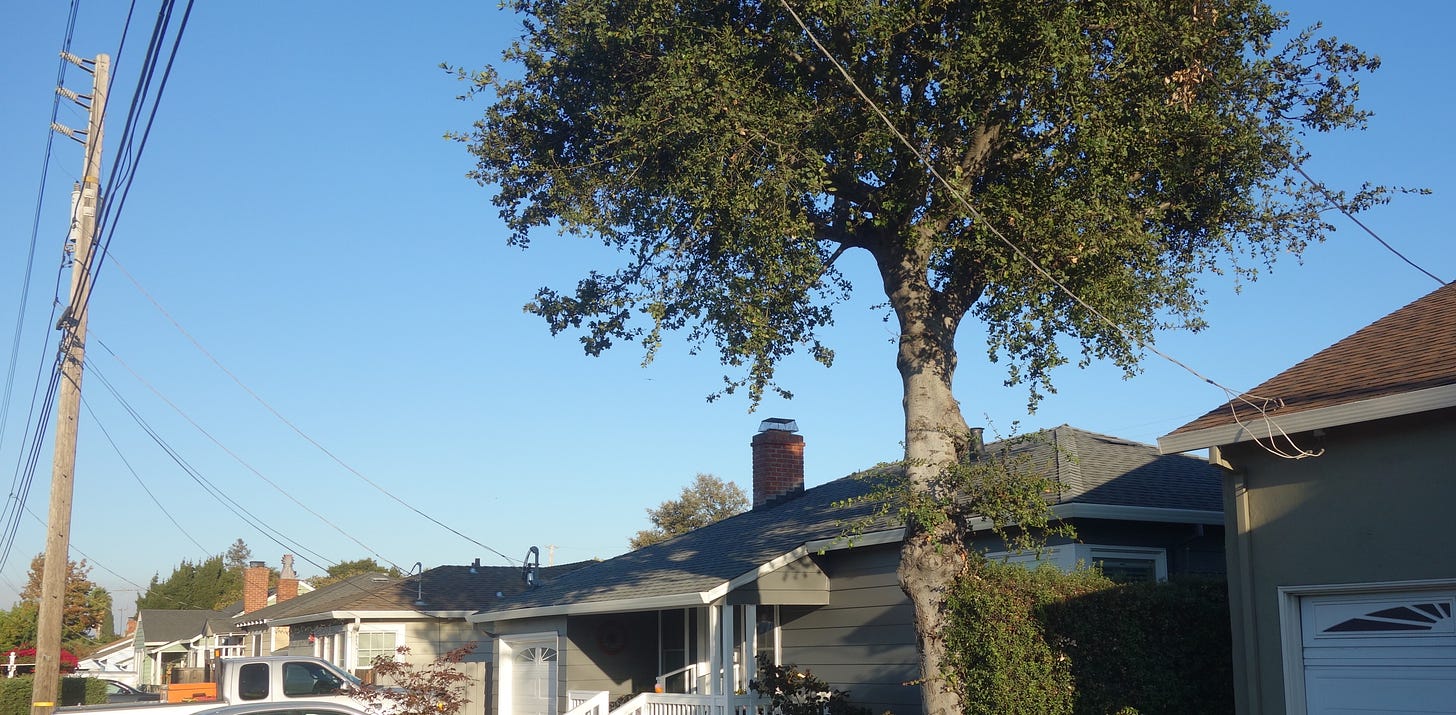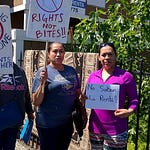About This Episode
Maeve Elise Brown came into my housing life in 2017. I was working with Steve King at Oakland Community Land Trust and Anna Cash, who is now at the City of Berkeley, on what we called Housing Vulnerability Analysis. This was our attempt to develop a way of seeing housing in a city through a simple question: how vulnerable was any given resident to being displaced (for whatever reason). One thing we discovered in this analysis was that low income homeowners were some of the most vulnerable people in Oakland. They had, and still have, few specific legal protections, or outside sources of financial support and even fewer advocates. We knew this in part because Maeve, and the organization she helped found and now directs, HERA (Housing and Economic Rights Advocates) is one of those rare advocates. Since that time, Maeve has always been one of the people that I could count on being clear eyed on the challenges that low income and BIPOC folks face when it comes to holding onto their housing, whether they rent, own, or somewhere in between. I hope you enjoy our conversation, which ranges from remembering the foreclosure crisis to why credit has become so important to housing of all kinds.
This Episode’s Guest
Interview Transcript
Alex Schafran: Maeve Elise Brown. Welcome to Housing After Dark. It's really wonderful to have you.
Maeve Brown: Thanks, Alex. It's wonderful to be had.
Alex Schafran: It’s now tradition here to talk about your background and how you got into housing. How did you become a houser?
Maeve Brown: I became a houser based on what I saw my clients going through primarily when I was a baby lawyer at Legal Aid Foundation of Los Angeles. I was a generalist working on public benefits, social service, disability, and lots of other things. But I found the work on housing cases so compelling. I had so much freedom from my wonderful boss to stand out there in the rain in the dark at Mar Vista Gardens (a public housing project in East Los Angeles) and help people organize. I had freedom to work with a big privately owned building on tenant organizing and lots of other stuff as long as I also did all of the eviction defense and other things asked of me.
It's funny, you and I spoke briefly before this program about my own housing experience. At the time, I never actually wove together what I was working on with my clients with what I was experiencing. Because for whatever reason there was a sort of a divide in my mind. Years later, I could think back on: “Ooh, that horrible place where I lived, that had habitability problems. Or that other horrible place also with habitability problems.” And experiencing housing insecurity as a student trying to get through law school and trying to keep up with my public interest focus.
Alex Schafran: It does strike a nerve with me. I became a houser after a number of years doing immigration, legal services, immigration rights work working with a lot of folks in the public interest law space, and similarly was starting to notice that even if we could help my clients with a green card, or a work permit, or asylum, it was “Welcome to the Bay Area housing market circa late 90s” which was pretty brutal. Not as brutal as it is now, but it was still pretty brutal.
And it was something that I was facing and my friends were facing. It's interesting how there are some housers who immediately make that connection between their own lives and others (like us) it takes a while to connect the dots.
How do you go from being a legal aid attorney who does eviction defense starting to see beyond the basic eviction issues around habitability. How do you go from there to starting Housing and Economic Rights Advocates (HERA)?
Maeve Brown: It was really an accumulation from those early experiences and feelings in working primarily with tenants. I also volunteered at a domestic violence survivor clinic when I was in Los Angeles and pieced together that with my next stage of working with tenants for a bunch of years in the Bay Area, and same with older folks and other folks of modest means.
Then I took a job at the National Housing Law Project (NHLP), where I was working on Section 8 homeownership, which was so interesting. I would say that was the space where my little brain just got the big picture. It was a big jump for NHLP. They didn't have any expertise in homeownership, but they did have tons of expertise in Section 8. So it was a piece of my work.
And we worked with the National Consumer Law Center and my brain opened up to the giant, bigger picture and suddenly started weaving everything together from the beginning parts of my real experience just looking around at the world differently. Realizing I missed an opportunity to work with the Greater Watts Justice Center at Legal Aid Foundation of Los Angeles because I didn't value homeownership. I just didn't see it. I was so focused only on folks who were homeless and/or tenants.
There’s this continuum, which I think will connect with a later part of our conversation. But there's this continuum in our existence. To me what remained a consistent theme is you have to have a safe, affordable roof over your head, as a tenant or homeowner. If you don't have that, it's harder to keep employment, it's harder to stay healthy, it's harder not to lose your mind. How do you have a good life without that?
That really moved me in the direction of starting HERA when I really saw the debt and credit pieces as the big missed opportunities and huge need that people have out there. It was really hard to find a place that would work with you on those issues.
Alex Schafran: I've tried to emphasize this in my work, and I think it’s one of the ways we connected, is that certain basic housing rights should be independent of housing tenure. There are a lot of different housing tenures out there. Sure, they are important technically. But whether you are worthy of being protected and worthy of that safe and secure home should have nothing to do with that tenure. Tell us more about Housing Economic Rights Advocates, otherwise known as HERA, my favorite little organization based in Oakland working statewide that not enough Californians, even housing professionals in California, have heard of.
Maeve Brown: So we have a broad economic justice and anti-discrimination mission. Within that, housing is the first word in that name for a reason. Because I value and we value as an organization: access to, and retention of, safe and affordable housing.
We serve both low and moderate income people for free. I always noticed when I was a baby lawyer how many people could not get through the door. I could have been a client, I had needs too, but I really noticed that people were turned away at the front desk and that stuck with me. About 12 - 13% of our clients are self selecting moderate income in any given year and then the rest I have are from zero income to low income.
We work on household debt and credit issues that impact almost all of us, including if you're homeless. We have clients who are living on the street who have student loan debt from predatory for-profit schools that's inhibiting their ability to access housing. If you were foster youth or if you were incarcerated or homeless, identity theft, is common.
Credit is the way that our worthiness to access housing or employment is measured. That’s the benchmark we've set in our country. Not only do we really want to break some of that close linkage, which seems to have only grown closer, but to address the problems that everybody has. Who hasn't paid something late and yet that's going to show up on your credit report? Student loan debt? What about all the credit card debt Americans carry? What about mortgage debt? What about medical debt? So many people don't have medical coverage in our country they’re paying for stuff sometimes on credit offered by the provider, especially for dental work. It's a vast arena.
So thus, we start HERA to fill that gap. We do a lot of training for other professionals, but we do a ton of consumer workshops, lots of direct services. We love collaborating with legal services and non attorneys as well to get the information out there. Every type of debt has its own type of rules associated with it that can actually be really helpful to all of us.
In addition to that, over the years, we've added work with tenants mostly in a space that legal aid has pulled back from, which is all those things that happen to people before they get served with an eviction summons. And I understand legal aid pulling back. They can't do everything and don't get enough funding to do everything.
So our reach is broad. Our notion about what it is that we should do is broad. We look at intergenerational wealth building and transfer as well. Having a segue into that foreclosure piece, having watched lots of residents in our state use the family home in the foreclosure crisis, in part because they had no estate plan in place. And so we couldn't get a loan, we couldn't get a loan modification, because there was no clear title to the property. We added that practice in 2017, also not a traditional legal service practice. We’ve also just very quietly and secretly started a probate (at least advice) practice and we'll see where that goes.
Alex Schafran: I really appreciate the many ways you define your area based on the larger problem and try to work holistically across the whole kind of debt and credit space. Regardless of the income levels of the people involved, regardless of where in the problem they are (and with full respect to organizations who don't always necessarily have a choice about where they plug - sometimes the funding demands that they only plug in at a certain time, or that they only plug in with certain people) but for what it’s worth it's one of the things that has always impressed me about HERA. It’s how you have that holistic approach and try to build the organization around it against very difficult odds of surviving as an organization in the current moment.
You mentioned foreclosure and loss of wealth. I mentioned this in my brief introduction of Maeve. Maeve and I met because, together with Steve King and the Oakland Community Land Trust, we were working on developing a vulnerability analysis, a way of understanding how people were vulnerable. We were trying to understand, what are the things that make people vulnerable to losing their homes, regardless of their housing tenure, and one of the things that we knew was that it wasn't just enough to have policy and the law on your side, you had to have an advocate on your side, preferably a trained one, preferably somebody with a law degree, especially for these kinds of things.
Looking around in Oakland, who was it that was helping in fighting foreclosure, who was helping low income homeowners that were vulnerable people being preyed upon, it was basically HERA, and mostly only HERA. But I want to take us back before this moment where I met you trying to build this vulnerability analysis, and we'll talk more about general vulnerability.
Your organization was on the front lines when we witnessed the largest loss of wealth of people of color in US history starting in fall of 2007, but really getting into 2008, 2009 and 2010: the foreclosure crisis. Which I feel like so many people have forgotten, or there's actually so many young housers who listen to this show who were in middle school when the foreclosure crisis hit. So take me back to when HERA was started in summer of 2005.
You're a pretty brand new organization getting on your feet, probably seeing everybody lending money to everybody left, right and center and all of a sudden, two and a half years into it or whatever it is, the wheels start to come off the bus and guess who takes it on the chin the most.
Tell me a little bit about what that moment was like and how you see the foreclosure crisis now in retrospect, if you can believe it's been 15 years since 2009.
Maeve Brown: I knew that the foreclosure crisis was coming to California when I was working at the National Housing Law Project, which was more fire underneath my feet to start HERA and to focus us on mortgage foreclosure prevention at the time. I knew it because I was doing trainings all across the country on Section 8 homeownership, and talking to mixed groups of HUD certified housing counselors, and some private consumer attorneys who are out there doing good for folks. I was hearing the stories about what was already happening in Illinois and North Carolina.
Every story I heard just prompted me to read and try to understand how in the Hades, this universe I was looking at could be so different from what my dad, my grandfather, experienced in this one arena. It was inevitable it was coming to California. But I do remember trying to raise money for HERA and having funders be like, “We like you. So even though we can't see what you're talking about, we’ll give you some money.” There were a couple of funders who trusted me enough to go ahead and give a little bit of funding to go ahead and get us started.
And then we got walloped by 2008. People could start to see some of the writing on the wall because I was pointing to our refinancing rates 2006 and 2007. Hideous amounts of quantities of what are called piggyback loans first and second, taken out simultaneously, tons of other abuses. And it's so interesting, Alex, these HUD certified housing counselors, every place where I've done training when I was still at NHLP. They were like, “Wow, we thought we were looking at something really ugly, but it was improbable. We didn't know where to go, there was no place to send people for help.” So it was eye opening, across the board, also for consumer attorneys.
And to me the amount of fraud, just blatant, unrelenting, completely unrepentant, huge amounts of money from Wall Street flowing like Niagara Falls down to people who are untrustworthy. It just seemed clear at some point that the merry-go-round was going to have to stop. I did not predict the foreclosure crisis, but I definitely saw it was unsustainable. I didn't realize how long and how hard the crisis of some sort would be. That's how I got there.
Alex Schafran: And then I imagine when the flood hits, you're there, but not a lot of other people are helping carry the sandbags. So what was that like? I imagine you were able to help some people, but not even close to everyone.
Maeve Brown: No. Not even close to everyone. We were trying to make good choices about what to do with our time. There were just a couple of us. Training legal aid organizations was a good starting place. I remember those early training sessions of Legal Services of Northern California on these topics and what the rules of the road were. And of course, we/I continued to learn something new every year and so did National Consumer Law Center and other folks, private attorneys who were on the consumer side.
I remember workshops in Fresno with like 700 people in attendance, predominantly people of color, many immigrants, many were not. I remember going to Greenfield; it's more of a coastal town. All Spanish speaking homeowners in a room full of about 80 people. Almost all of them had option adjustable rate mortgages from World Savings which then eventually was purchased by Wachovia. People don't know what an option arm is. The short explanation is, it's a structure that used to be prevalent and permitted where you could pay less than the amount of interest that was due every month on your mortgage. But that money didn't go away. It got added on top of your mortgage. So you're paying every month and you think, “Okay, this is a payment amount I can afford.” and instead your mortgage is growing until eventually they foreclose on you.
Alex Schafran: So you're doing this work in communities, not just in urban California. This is a lot of rural California. This is heavily BIPOC California, not always English speaking California. We're trying to work with local housing advocates and legal aid folks to try to help save people's houses. I imagine you had some success stories alongside watching things go down the tube?
Do you think this whole experience of foreclosure changed the affordable housing or the legal aid or the kind of the communities that work to advocate for lower income and BIPOC California? Do you think it changed how they saw homeownership in either good ways or bad ways? Did it become an issue all of a sudden? Was it “Hey, we need to work on this”? Or was it “Hey, this is just another reason why homeownership is bad. Let's continue to not do homeownership.”
Maeve Brown: That’s a great question, Alex. I think it definitely changed what legal aids across the state are doing or trying to do or at least for the ones who didn't take on doing homeownership preservation work because they became conscious. And they began to become conscious of the continuum of the fact that, “Oh, my clients should not be ripped off just because homeownership is not just a wealthy person's issue.” Drawing that line in our head, sometimes between the personal and the external, once again, for people to realize, “Hey, you're not wealthy. We talk about this as wealth building, but this is just like trying to be middle class and then trying to have something to pass to your kids. And the grandkids.”
Until people forget completely, or until the next crisis like this, then we've definitely seen change and housing counseling agencies as well as legal aids. And more broadly, we get referrals from realtors and brokers and banks as well and so created new relationships. I'm not saying all realtors and brokers and banks are good by any stretch of the imagination. I'm just saying we found some of the decent people who are still decent out there and who referred folks to us who are having a problem.
Alex Schafran: I think in certain housing spaces, saying that all brokers and bankers, etc. are not that bad, would also be a positive step. That’s a lot of what I've been trying to do, trying to get people to see the full housing system and to start to see actually sometimes what are often minority voices within those industries.
We’re having upcoming episodes featuring folks from the realtor industry. I'm hoping for Nikki Beasley from Richmond Neighborhood Housing Services to talk more about the homeownership counseling industry, just as an attempt to get people to see the full housing system more.
I want to talk more about the future of homeownership down the road because we're gonna talk a little bit more about credit and the current work that HERA is doing around credit. But I want to see if we can drill down a little bit more around this issue of vulnerability because I think sometimes when I talk about homeownership and why I think it's important, and people either have this idea that somehow homeowners don't need help because they are wealthy and or they're somehow not worthy of help.
More and more, as when you do the studies, you see large amounts of lower income homeowners. There are people with very little income who have paid off their houses, and our house rich and cash poor all throughout the state and who are very much in a state of vulnerability. But vulnerability was this issue that brought us together in many ways. Now HERA works, not just with homeowners, but with a lot of different people who are vulnerable to exploitation, to eviction, to displacement. How do you think about this issue of vulnerability? Is it something that drives how you determine where you work and the types of issues that you work on?
Maeve Brown: I love the question. Yeah, it totally does. So we work with homeless residents and people who are tenants and people who are homeowners, and we're constantly checking in with ourselves with each other as staff about like, “Oh, okay, should this type of problem be a priority for us over here?” because we keep our doors pretty open. It’s pretty easy to get to us. And we're open to learning about and taking on new things.
We've expanded our work with homeless residents and very consciously expanded our work with domestic violence survivors. Expansion to me, in large part means reaching out actively to make sure that people know about us. Being out there now that we're out of the pandemic on the ground, in person. So if you're homeless, and you have debt problems, which means you almost always have credit problems, then you can't access housing, or if you and even if you have good credit, sometimes credit is used frequently as a pretext for unlawful discrimination. So there's a real nexus between fair housing and what we think of as a traditional housing related topic. And more debt and credit.
Flip side of the coin. For tenants who are trying to get out of where they are, because they've been unable to get relief from whatever problem they're experiencing with property owners or management. Or maybe they want to become homeowners because they'd like to be able to have something to leave to their kids or their grandkids'. Debt and credit are in the mix.
I don't want to wander too much. But I'll say the largest pockets of debt that we have as residents of this country at this point are student loan debt, mortgage debt and credit cards, I think medical debt might come in fourth. It's either medical or auto loan debt. We're such a far flung state with people having to live someplace different from where they're working, because they can't afford to live where they have their job. Auto related debt is huge.
Alex Schafran: More and more, I think this show is featuring people whose organizations and work straddle housing and something that is not officially housing. Credit is credit and debt is debt. Unfortunately we live in a country where a missed payment on your car can impact your ability to be housed and there's just no way around that. Maybe there is a way around it. But that path currently doesn't exist.
Those two things are very much linked. I love how you all meet people in many ways where you're at. At times the housing world can be very judgmental about how you're meant to be living and what you're meant to be doing, and what is a good form of housing. And I really appreciate how HERA approaches through what I see as the lens of vulnerability and works on solving the specific vulnerabilities that people have, regardless of where it comes from and regardless of what their aspirations are for what they consider to be a good life.
One of the things I love about being a homeowner is the ability to plant fruit trees, which is something I've talked about in my writing about homeownership. For me it's a tenure that is absolutely necessary because I just need the ability to, at this stage in my life (again, it wasn't something I wanted 10 years ago or 20 years ago) but it's important to my housing now.
Maeve Brown: There really is a value to homeownership if we want to see people who are low income be able to do better. When you were talking, I was thinking about the studies that talk about the health impact of seniors having to move out of the home that they've been living in - the negative health impact of being forced out of their home. And right now, anybody 65 years of age or older in America is carrying on average about $250,000 or $260,000 in mortgage debt, which is more debt on the family home than ever before. They also have a giant target painted on them for predatory lenders still because there's equity to be stolen. But I love that emotional psychological well being piece that you called out there with you and your fruit trees.
Alex Schafran: I love that you're able to do something we don't do enough in housing. And I feel like maybe I need to do more of this. Which is calling out fraud, you just used the word to steal, which is sadly a big part of our housing system, and has been for a really long time. It comes in all kinds of colonial and not colonial and racist and less racist versions of the same. But at the end of the day, one of the things that just makes it so hard for us as housers is how many sharks there are in the water constantly.
We make a new public sector program that is designed to do well and may even be pretty well designed, people will come out to try to abuse it to use it. And then that abuse will be used by people who are against these programs as a sign that these programs can't work. And it's just really kind of sad. I don't think people appreciate it, especially people who are well housed, and don't currently have predatory debt or anything that will get them out, just how many people that are out that are looking to sell them something that will result and then losing their house. Is anti-predatory work still a big part of HERA’s work on a day in day out basis?
Maeve Brown: It is but it looks different. Because the creditors look different than they did. With the foreclosure meltdown, there were a lot of the bad actors and almost nobody went to jail. And that's a real shame. I have never been such a fan of law enforcement and jail until working on mortgages. I was like “Yes! Yes! Do it! Put them away.”
So the predatory piece looks a little different. And one of the things that we're learning about, definitely gonna call out, is that with heirs to the family home, if the title is floating around out there, unresolved, there's a whole cottage industry that focuses on very high cost lending to heirs, and to try to stick wealth from people who are waiting on the probate process to resolve itself assuming anybody's actually probated the property to clear title. So it's out there in different forms.
Alex Schafran: Tell me a little bit about HERAs current work on credit. You've mentioned debt issues across the board that have an impact on housing or are directly related to housing. What is HERAs current focus on credit?
Maeve Brown: We have really dug in starting in about 2015 on the broader debt and credit issues that people were having. Learning about the credit reporting error rate, which in and of itself is an issue. About 25% error rate, according to the Consumer Financial Protection Bureau on the high end of the estimate. And then educating ourselves by learning from our clients that they were experiencing regularly being turned down for housing based on bad credit, or allegedly bad credit. It's remarkable how many people did not know but there's a growing consciousness now out there that “Hey, somebody's going to look at my credit, it's going to matter, maybe I should learn how to improve my credit.”
There's a whole cottage industry of debt settlement companies and folks who are saying if you pay us money we will improve your credit. Anybody else's misery or need turns into somebody else's opportunity to make money for nothing. Nikki Beasley has been referring people to us who want to become homeowners and who have debt issues that need to be resolved or credit reporting issues that need to be resolved, and need the help of a lawyer to go ahead and handle some of that.
We continue to see significant credit reporting issues. But let me talk about the debt piece, because that gets you into the credit problem. Debt in our country still has a radioactive half-life through being sold and resold to debt buyers. We have just an explosion of clients who are being pursued by debt buyers, not the original lender for debt that they legally may no longer owe, or perhaps they never did owe.
We've expanded our work on that hugely. We started collection defense clinics in Sacramento, Modesto, trying to get it off the ground in Solano County. We've had one for many years in San Joaquin County and Stockton, to try to get to people who we haven't gotten to before. They’re being sued for miscellaneous debt and usually small dollar amounts, but it's going to hammer them for a long time to come. I would say that some of the face of our more current work is to do more of the clinics. Maybe the face has remained the same, but we've expanded our access point.
In my list of injustices that make this country a hard place to work, if number one is the number of sharks in the water, number two is how very small problems can become this radioactive half life. You hear it when it comes to a parking ticket or a small fine the way we allow these things to escalate, and partly that it's driven by the predatory sharks in the water that are moving this along.
Alex Schafran: This credit issue is something that spans different housing tenures, right? You said you're working with people that are unhoused, tenants, homeowners. How do you see credit being important to people who aren’t homeowners or even don’t necessarily want to be but are trying to get themselves into better rental housing, subsidized housing or supportive housing of some kind.
Maeve Brown: It’s a fundamental issue, because you will just not be able to get in if you don't pass the credit bar, and there's not a consistent application of credit. It becomes a bit of a black box for people because they don't know what the rules are, and they don't know how to do better and how to take care of credit problems. And I think, for example, of clients of ours who are survivors of domestic violence, who are living in a shelter.
I remember a woman I was talking to, who had applied for housing and was managed by the John Stewart company. She was really on the up in terms of the upward trajectory. She had worked so hard to try to create a clear path for her kids and herself. She was conscious of the concept of credit. But she was carrying a bunch of debt from her abuser who had forced her to cosign for all sorts of stuff. He was in jail and here she is trying to access credit. When she called our office, she'd just been turned down for housing that was managed by John Stewart (not to pick on just John Stewart, because they're not the only ones).
It’s one of the first times when we advocated directly with property management, to change their minds and to request that they consider a different standard. I put in my advocacy letter, look at all these other things that this woman is doing. Look at where that credit problem came from. This was not voluntary on her part. And they changed their minds and they let her into the housing. It was really striking to me that I actually don't think they knew what they were looking at. Property management looked at a score. I doubt that they actually knew anything really about this woman's life, what she'd been through or what the numbers mean, what the report means. So that's one example for homeless residents.
For tenants. Your credit, if you're trying to get into another rental, let's say, you have somebody who's going after you, you're living in hideous conditions, you withhold rent, maybe you actually still paid like a slot machine, but property owner is claiming you haven't paid rent, and is holding the threat of bad credit reporting over your head, or has maybe already reported. Who's going to help you? Do you even know what your rights are? You didn't have time between your day job and the rest of life?
Those are just a couple of examples just for tenants and for homeless residents about why it matters and it's just a little bit about what we're doing.
Alex Schafran: I appreciate you helping us understand that. I think at times we misunderstand a gap between homeowners and renters, as if it's two very different worlds where the worlds are often connected. I appreciate you willing to tell what ended up being a good story about John Stewart (if you're listening, John Stewart, I hope you appreciate it before you fire off an angry letter to either of us).
There's a really interesting report out by Urban Habitat this past week by Chris Schildt and her team looking at some of the challenges around rent increases in housing that is funded by the Low Income Housing Tax Credit. Sometimes these are non profits, sometimes these are for-profit companies that are owning subsidized housing. Many of the practices of the “market rate” world and the “affordable world” are actually very similar and they're often linked by credit. It drives me crazy that we maintain this dichotomy between market rate housing and affordable housing, which is just not real. It is not the way it's experienced on the ground by either many of us in the industry, I would argue, and by many of us who are trying to acquire this housing, I think it doesn't help us.
I also hope that people hear when they hear me talking about really similar vulnerabilities around in credit, that impacts both homeowners and renters that that people start to see this as an opportunity for some sort of political solidarity between the folks who are advocating for affordable homeowners, which isn't a ton of people (shout out to Habitat for Humanity folks, my friends in California Community Builders and the various other people that are fighting for it).
I think there's some new opportunities around building solidarity between homeowners, want to be homeowners, hope to be homeowners, renters, hope to be renters, all of us who just want safer and more secure housing, regardless of tenure and wanna be able to make that choice. Are you at a fruit tree point in your life or are you not at a fruit tree point in your life.
With all this having been said and all the work that HERA has done to try to help folks either rebuild credit so they can get into homeownership or hold on to the homes that they have. You don’t seem sanguine about the challenges of doing that given all the challenges, but you also don't seem hopeless. What is it that (when it comes to homeownership or just housing in general) that keeps you going?
Are there things that you'd like to see? Important changes that you feel like we can make as a housing industry in California that would make it so that you wouldn't have to work so hard? Or is the only answer that there just needs to be more of HERA?
Maeve Brown: That's a great question. I'll start with what I think is one strategy. There are plenty of things that make me hopeful. One is this conversation. The other is that this conversation is actually being held more broadly by legislators and by neighborhood associations, right? We have a Yes In My Backyard movement. Who woulda thunk it? And it doesn't mean that any of us know everything about what should happen or how to do it. But there's a rolling consciousness that actually, a lot of us sit in more of the same boat together than we realize.
To the extent that housing, whether it's rental housing, or homeownership focused, has been an economic driver for the United States since the 30s. It was a part of our economic recovery that has become so built in. You hear that drumbeat from nonprofits who are trying to encourage homeownership. It has become a wealth building tool (and by wealth, I mean becoming middle class, if you're not. It's really a misnomer).
But for a policy, one thing I think is really interesting, is vacant property taxes by localities and states that have driven some of the many vacant properties back into the market, in places that have experimented with it. So like in Vancouver. I guess I did have to go out of the country for a good example. But they're far enough along so that they've seen that having that tax actually has significantly changed how many properties are being kept off the market. We have in our state this year 11% of homes that are unoccupied (and homes, including rental homes, also include some vacation homes, and single family properties).
Basically, we have a number of homes available that exceeds the number of people who are homeless in our state. And yet, all we hear about is let's build some more. The industry loves that. The building industry loves that. And I'm not saying we shouldn't build anything. I'm saying there's a real bizarre gap going on here. And I think localities in the state are just starting to get hip to the fact that they need to have a better sense of what's going on with land and property in their own backyards. And I think I think it's starting to happen, some. That’s another thing to be really positive about.
Let me also suggest, as a possible thought for you and your listeners. Unless we make housing affordable from the get go, United States will not be. It's just pretty hard unless it's designated as affordable in some fashion, structured in some fashion, and maybe there's another way of structuring affordability beyond our current tools.
Alex Schafran: We certainly agree on that last point about the intentionality as super important. I'm a big fan of building a lot more boxes. I think we need a ton more of them. But the number of homes that are out there, I think can do a lot to help us with housing availability and housing accessibility. But boxes are really expensive to build and they're really expensive to maintain. So this idea that somehow just flooding the market will suddenly result in prices that are affordable given how wide the income inequality gap is and the fact that it's kind of getting wider and wider. I’m not one of those “If you build it, the prices will go down” YIMBY’s. Maybe that's also why I won't use the term to describe myself quite as much.
I'm not sure if I see the vacancy issue as much as a housing problem as you do. The one thing that brings us together around vacancies is that the vacancy challenge is about who owns the unit. And it's about a better system for regulating and trying to be a little bit more intentional as a society about who owns units.
That is something whether it's LLC transparency (I have this piece of writing coming up about all the bills trying to regulate the purchase of single family homes by large corporations). If you read the vacancy thing about Blackstone, which to me is what it fundamentally is, it's about sort of some of the investors and how they've purchased homes and how, in different ways they have distorted the housing market in a way that just makes it more and more inaccessible. I think that is where it comes together.
I love that you mentioned pro-YIMBY stuff and vacancy issues. Those are two camps that are often at war with each other on Twitter and I don't think that that is the war. That's not the fight. They're both really important issues. There's times we'll have vacancies for all sorts of reasons. Sometimes houses lie foul because of probate issues, and the sharks are in the water, and the title isn't clear. Sometimes houses lie empty because they are shit holes and nobody has the money or the time to be able to fix them up. And we don't have good systems to help low income homeowners or help low income landlords even fix things up. So things lie fallow.
HERA for me embodies a lot of the real holistic spirit that I hope that others can bring to the housing industry. And I appreciate your work and the attention to vulnerability. And it's just been great to have you on the show.
Maeve Brown: It’s been an honor to be able to spend this time with you, it has been really fun, and I love all the good that you bring to this space.
Alex Schafran: Thank you so much. You've been an inspiration from the start, ever since I met you. There would be none of the show and none of my work without the times that we've had together chatting about housing and appreciate, again, the help on housing vulnerability analysis and everything that you've done. And the work that you do, HERACA.ORG is the website.
As a final note, one of the ways that I know you keep yourself sane as a houser is to do something that is not housing, which is music. So just to carry us out, give us just a little bit of a brief tidbit on your musical career. And again, we will include links to Maeve’s music in the bio as well.
Maeve Brown: I have been a closeted musician and now I'm out. We have a website eliseandstevemusic.com and we're on YouTube and yeah, it's the greatest joy. I’m a singer songwriter, have actually been writing songs since I was a little girl obviously the songs I wrote when I wrote when I was a little girl were lousy. But it was funny that it's like singing and writing music for my whole life has been a space of release and catharsis and sometimes singing very clearly about injustice as part of that release. I get to do this now visibly as a grown up.
Alex Schafran: Well, housers I don't know if you'll get much release or catharsis from your day job. So if this is a lesson, I hope you have a hobby. Maeve Elise Brown, thank you so much for being on the show. It's been an honor.
Maeve Brown: Thank you so much, Alex.















Share this post